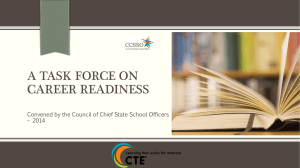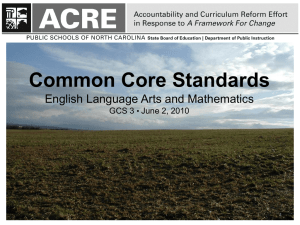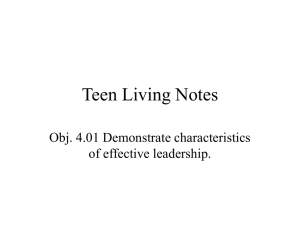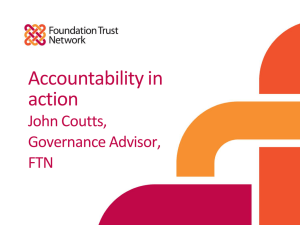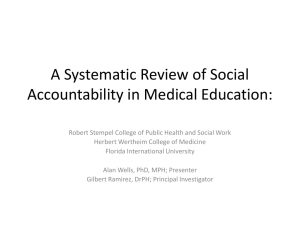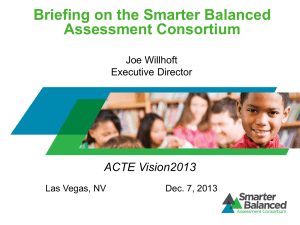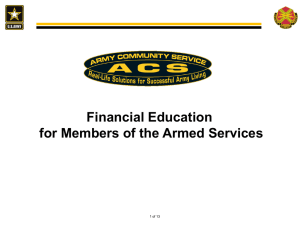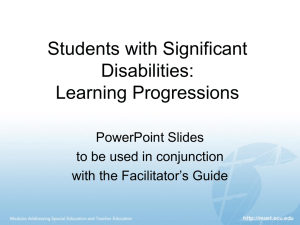Document
advertisement
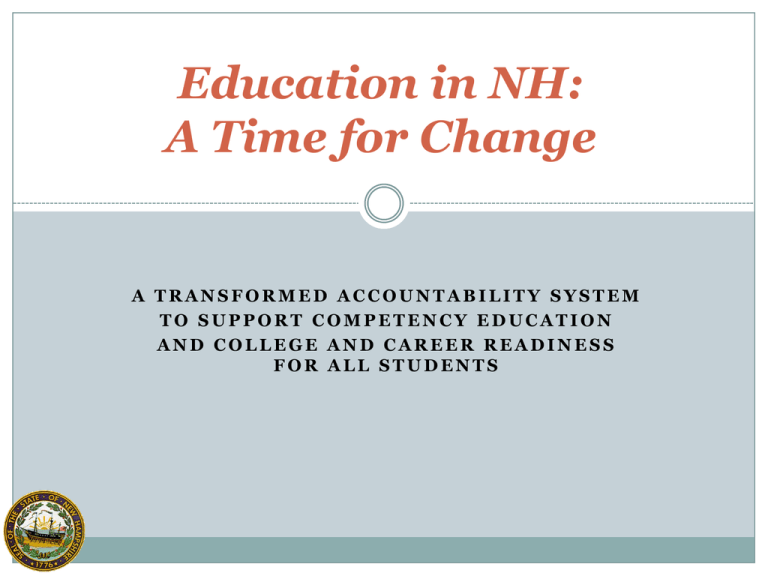
Education in NH: A Time for Change A TRANSFORMED ACCOUNTABILITY SYSTEM TO SUPPORT COMPETENCY EDUCATION AND COLLEGE AND CAREER READINESS FOR ALL STUDENTS We Need A New Goal-Line For Public Education in the U.S. REAL GOAL LINE INTERNATIONAL GOAL LINE CURRENT GOAL LINE A Conceptual Playing Field of Preparation for College, Career and Life “What gets measured, gets done.” Where do the ways we assess student progress today fall inside this learning field? KNOW KNOWHOW Debating Internships Jr. Achievement Yearbook Creating Evaluating Analyzing Applying Scouting Science Fair Sports Term Paper Complex Authentic Simulated Authentic Understanding Remembering FOUNDATIONAL KNOWLEDGE Mastery of English • Math • Science • Social Studies • Arts & Languages NonAuthentic GENERATIVE KNOW-HOW The ability to understand and integrate Resources Technology Information Systems Interpersonal To meet personal, civic, and workplace objectives Defining College and Career Readiness • NH has adopted the CCSS in ELA and Math and has developed an implementation framework to drive state and local work (hardcopy provided). • We have expanded our definition of CCR to include knowledge, skills and dispositions. This will inform our desired assessment and accountability system. Knowledge – refers to mastery of rigorous content knowledge across multiple disciplines (including but not limited to reading/language arts and mathematics) that serve as a foundation for all learning. Skills – refer to the higherorder skills that students need in order to extend and apply rigorous content knowledge in the ways that evidence indicates are necessary for success in college and career. Dispositions – Socioemotional skills or behaviors (sometimes referred to as habits of mind) that associate with success in both college and career. A New Kind Of Accountability ~ State Level Underlying Assumptions 5 Every District, school, and educator has much to learn and demonstrate to accomplish the overall goal, every student college and career ready. “Shaming and Blaming” districts, schools, educators, or students will not accomplish the big lift we need to accomplish. “Readiness” means students exit high school prepared to succeed in high-quality postsecondary opportunities, whatever pathways they choose. The Common Core Standards are foundational to College and Career Readiness but there are additional important dimensions. Every student is entitled to an education that provides a foundation for success in lifelong learning, career, and citizenship. Causing consistently high levels of learning among young people from widely varying backgrounds and with diverse needs will require radical changes in current policy, practice and structure CCSSO Innovation Lab Network State Policy Theory of Action Outcomes Goal 1. States define and systematize college and career readiness consistent with deeper learning 2. State education systems provide personalized learning to all students 3. States establish comprehensive assessment systems to measure college and career readiness 4. States anchor accountability systems with college and career readiness 5. States develop seamless pathways to college and career Prepare every student for college and career New Hampshire’s Theory of Action 7 If we believe that all students must be college- and careerready... Then our system must advance students as they demonstrate mastery of content, skills and dispositions… Which requires a comprehensive system of educator and school supports. Supporting the New Hampshire Ecosystem Organizing and leveraging assets 8 to better support the overall strategy, with the ability to track and manage “progress” against milestones while remaining attuned to staff interests and needs NHDOE Internal Liaisons “Talent Cloud” Knowledge Base NHDOE’s Vision & Challenge How do we build ONE aligned approach that perfects our existing model, while simultaneously building what our students need for the future? NCLB Future Accountability System NH “Four Pillars” Strategy NH Future of Learning FUTURE “Inventing the New” NEXT “Improving the Existing” NOW A Truly Networked Strategy Three types of networks – supporting efficient access to information, expertise and targeted supports – link NH education professionals with local, state-wide, and national resources. Access to Networked Resources US/ Global EACH OTHER NH NH Regions NH Districts INFORMATION EXPERTISE – National Experts EXPERTISE – Within & Across Districts SUPPORTS – Technical Assistance Networks SUPPORTS – Knowledge Networks SUPPORTS – Innovation Networks Building A Single, Integrated Model 11 Impact “Better for kids” is a continual process, not a destination… Innovate Great Good Transform District Transform School Stable Prototype (New) Crisis Learn Experiment (Existing) Improve Time Re-thinking Networks 12 Building on existing structures, but being clearer about a continuum of options for districts and schools based on need and interest Time-limited/ Rapid Prototype Improvement Innovation Traditional, Standing Network Seeding and Growing an Innovation Cycle 13 Continually Driving Alignment to NHDOE “Four Pillars” Strategy NHDOE Growing Demand Based on Interest and Need within the Networks The New Hampshire Network Benefits of This Push All of this work will help accelerate our ability to build a new system to better meet your needs, which in turn removes obstacles and promotes better outcomes for kids MOVING FROM EVOLVING TOWARD Compliance Support Punishments Rewards Hierarchy Flexible Networks Test-based Accountability Professional Responsibility Standardized Personalized Reactive Proactive Static Dynamic Supply “push” Demand “pull” 15 Understanding the New System - Waiver Four principles underpin the Federal Waiver. This offers states the opportunity to implement an alternative accountability system. 33 states have been granted waivers to date. Principle 1: College and Career Ready for All Students Principle 2: Differentiated Recognition, Accountability & Support Principle 3: Effective Instruction & Leadership Principle 4: Reducing Duplication & Unnecessary Burden College Ready Standards and Assessment 17 NH has adopted the College and Career Ready Standards in ELA and Math We believe that the CCSS and the SBAC are “necessary, but not sufficient” in helping to define and assess college and career readiness We are actively working with the Smarter Balanced Assessment Consortium to develop a competencybased approach to assessment and accountability. All graduating students will demonstrate college and/or career readiness by 2017 18 A new definition of college and career readiness requires: Conversations with Higher Education ~ NH has engaged this conversation through the implementation of the Common Core State Standards across the NH IHEs Conversations with Business and Industry ~ NH has created a new Business Education Roundtable to advance this discussion as the system is constructed. Our Approach to Instruction ~ Learning Progressions: The significant stages students go through in order to reach a defined educational outcome 19 As we build evidence of alternative paths students can traverse, this provides empirical justification for offering students choices among alternatives CCSS Progressions As students demonstrate that they have reached specific stages, we can assure them that they are on the path to success Curricular Progressions Instructional Progressions Learning Progressions As teachers gain a fine-grained understanding of the steps of learning and the problems students are likely to encounter, then they have a basis for identifying evidence in student work to locate where a learner is in the progression and for responding to this evidence in ways calculated to help them deal with any problems and keep moving ahead. Progression of Big Ideas Note: This model does not reflect all the mathematics at these grade levels or all the relationships Calculus P r a c t i c e s High School + Functions and Algebra Equations and Expressions Operations and Algebraic Thinking M a t h e m a t i c a l Marge Petit Consulting, MPC The Number System Proportionality Multiplicative Reasoning Fractions Additive Reasoning 21 6-8 3-5 K-2 SBAC Proficiency-based Learning Report 22 The top two priorities are: Prioritize increasing the number of assessments available in the SBAC interim assessment bank in order to make these “secure.” 2. Form a working group of experts and state representatives to create a detailed framework on how to implement competency-based learning and use the SBAC assessments to support this effort, to be published by June 2013. 1. Transition to Balanced Assessment System • • NH is a governing state for the Smarter Balanced Assessment Consortium and will lead a task force focused on proficiency based assessments. A partnership with the Center for Collaborative Education and the National Center for Assessment is ongoing to develop performance/competency based assessments. Dispositions Performance Assessments Skills Pilot Performance Assessments Science/Alt Math Smarter Balanced Assessments Writing Reading 2012-13 2013-14 2014-15 2015-16 Assessment Transition Timeline Pilot Smarter Balanced Assessments NECAP 23 NH will adopt a balanced system to assess student mastery along learning progressions. 24 Linda Darling-Hammond Performance Assessment Timeline 25 Cohort 1: Early Adopters Discipline Mathematics and English language arts Science and Social Studies Grade Span Development Year 9-12 K-8 Development Year 9-12 K-8 Launch Date 2012-2013 2013-2014 2014-2015 2013-2014 2014-2015 2015-2016 Cohort 2: Middle Adopters Discipline Mathematics and English language arts Science and Social Studies Grade Span Development Year 9-12 K-8 Development Year 9-12 K-8 Launch Date 2013-2014 2014-2015 2015-2016 2014-2015 2015-2016 2016-2017 Cohort 3: Late Adopters Discipline Mathematics and English language arts Science and Social studies Grade Span Development Year 9-12 K-8 Development Year 9-12 K-8 Launch Date 2014-2015 2015-2016 2016-2017 2015-2016 2016-2017 2017-2018 Defining a Methodology: Performance Assessment TA Network Owner: Paul Leather NHDOE staff team Partners: PD Centers Keene State College Center for Collaborative Education; Center for Assessment; Rose Colby College & Career Ready Standards Available on NHDOE Website Portal & www.qualityperformanceassessment.org KnowledgeBase: CCSSO ICCS ILN Linda DarlingHammond, David Conley, Center For Assessment Experts: “Talent Cloud” NH System of Educator Effectiveness 27 NH Teacher Evaluation Measurement Framework 28 Planning and Preparation Classroom Environment Professional Responsibility Instruction Student Performance Student Learning Objectives (SLOs) 29 SLOs are content- and grade/course-specific measurable learning objectives that can be used to document student learning over a defined period of time. Educators establish learning goals for individual or groups of students, monitor students’ progress toward these goals, and then evaluate the degree to which educators help students achieve these goals. SLOs are designed to reflect and incentivize good teaching practices such as setting clear learning targets, differentiating instruction for students, monitoring students’ progress toward these targets, and evaluating the extent to which students have met the targets. Defining a Methodology: Teacher Effectiveness TA Network Owner: Commissioner Barry Karen Soule NHDOE Partners: PD Centers IHEs Center for Assessment Comprehensive Center REL Effective Educators Available on NHDOE Website Portal KnowledgeBase CCSSO SCEE Center for Assessment – Scott Marion --Charlotte Danielson Group Experts: “Talent Cloud” National Policy Recommendations 31 Approach policy decisions for education with the student at the center, supporting student performance Personalization, including Move On When Ready 1:1 Computing System of Supports for Students ~ Network the Nation! Professional Development for all! Systems of Accountability and assessment that support personalized progress Data Systems ~ Mass Customization Equitable Funding!!! To Recap: What Did We Learn Along The Way? 32 It is important to look outward, to other states, other countries to see what can work to accomplish the goal. You can’t expect innovative, groundbreaking practice if you don’t incent it through the larger system. A New Theory of Action is necessary. To succeed in today’s lightening fast environment, innovation and improvement must be completely connected. To integrate innovation and improvement, you need professionals who are treated like professionals on the ground. This reality becomes the basis of a new Theory of Action.
